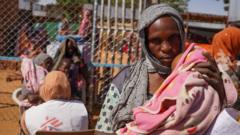A report from khartoum highlights the devastating impact of American aid cuts during Sudan's civil war. Families face starvation as crucial soup kitchens close, leaving more than half the nation acutely hungry. The tragic stories of malnourished children underscore the urgent need for renewed international support.
Humanitarian Crisis Deepens in Sudan Amid U.S. Aid Cuts

Humanitarian Crisis Deepens in Sudan Amid U.S. Aid Cuts
The ongoing civil war in Sudan has intensified following significant reductions in U.S. foreign assistance, exacerbating an already dire humanitarian situation.
In the besieged streets of Khartoum, the grim effects of the U.S. foreign assistance cuts are becoming increasingly evident. Families like that of Khadija Mousa are struggling to survive, as their communities suffer from the ravages of civil war compounded by soaring starvation rates.
The rollback of American aid, put in place during President Trump's administration, has shuttered numerous emergency food programs. Aid workers report that, in just a matter of days, vital soup kitchens — once lifelines for people facing the aftermath of relentless fighting — have closed their doors, leaving the population vulnerable and desperate.
Recent accounts shine a light on heartbreaking tragedies, such as the deaths of twelve severely malnourished infants in Khartoum. Among them was Abdo, an 18-month-old boy who succumbed to hunger after his mother rushed him to a clinic, where he was found too weak to fight any longer. His story, sadly mirrored by many, illustrates the urgent need for humanitarian assistance in a nation where over 25 million people are currently experiencing acute hunger.
“We're witnessing catastrophic outcomes,” said Duaa Tariq, an aid worker dedicated to confronting the crisis. The situation continues to deteriorate, highlighting the necessity for renewed international focus and support in rescuing the millions affected by this humanitarian calamity in Sudan.
The rollback of American aid, put in place during President Trump's administration, has shuttered numerous emergency food programs. Aid workers report that, in just a matter of days, vital soup kitchens — once lifelines for people facing the aftermath of relentless fighting — have closed their doors, leaving the population vulnerable and desperate.
Recent accounts shine a light on heartbreaking tragedies, such as the deaths of twelve severely malnourished infants in Khartoum. Among them was Abdo, an 18-month-old boy who succumbed to hunger after his mother rushed him to a clinic, where he was found too weak to fight any longer. His story, sadly mirrored by many, illustrates the urgent need for humanitarian assistance in a nation where over 25 million people are currently experiencing acute hunger.
“We're witnessing catastrophic outcomes,” said Duaa Tariq, an aid worker dedicated to confronting the crisis. The situation continues to deteriorate, highlighting the necessity for renewed international focus and support in rescuing the millions affected by this humanitarian calamity in Sudan.


















